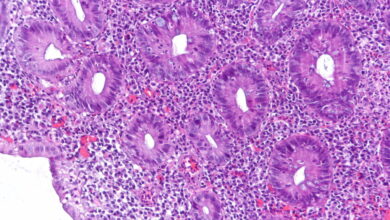Readout newsletter: Vir, Pfizer, Seagan

Want to stay on top of the science and politics driving biotech today? Sign up to get our biotech newsletter in your inbox.
Hi there, Meghana here — a little wistful about the departure of the illustrious Damian Garde but extremely excited about a fantastic newsletter co-author we’ll introduce soon.
Today, plenty of good stories to digest: We learn about infectious disease roadblocks at Vir and a hedge fund’s Seagen windfall, and see a Theranos-esque trial involving a falsified Covid-19 test.
The need-to-know this morning
- Ocular Therapeutix, a maker of eye disease drugs, said CEO Antony Mattessich was leaving the company and will be replaced by current Executive Chairman Pravin Dugel. The management transition comes two months after an executive and financial restructuring at the company.
- Regeneron Pharmaceuticals said it is investing $500 million over five years in a new health care venture capital firm, called Regeneron Ventures.
- Marinus Pharmaceuticals said an experimental treatment for refractory status epilepticus failed to meet early stopping criteria for a Phase 3 study. The study will continue but the disappointing interim outcome caused Marinus’s stock price to fall sharply in pre-market trading.
- Neumora Therapeutics said a Phase 1 study of an experimental drug for schizophrenia was placed on a clinical hold due to preclinical data showing convulsions in rabbits. The drug, called NMRA-266, belongs to the same class of muscarinic receptor modulators as Cerevel Therapeutics’s emraclidine, which was recently acquired by Abbvie.
Why infectious disease may not be enough for Vir
Vir Biotechnology’s mission was audacious: Instead of following the pack and targeting cancer, neurology, or rare or autoimmune disease, the company’s focus from the start has been infectious disease. It launched with an incredible $500 million in 2017, yet kept getting the same question: “Why the hell are you going into infectious disease?”
With Covid, the company’s value was suddenly apparent: Its drug, sotrovimab, brought in some $2.5 billion in revenue, and the infectious disease bent seemed to make sense. But that may no longer be the case.
In the last year, STAT’s Jason Mast writes, nearly the entire C-suite has been replaced, and the company’s new chief scientist has virtually no experience in infectious disease. Vir’s motto has changed from “A world without infectious disease” to the more vague “Powering the immune system to transform lives.” And it laid off 12% of its 600-person staff, including its entire division focused on new antivirals, while expanding the team that focuses on cancer.
“Taking on infectious disease as a corporate mandate is challenging in these times, even though the real medical need in infectious disease is tremendous and I for one have not lost my passion,” Vicki Sato, the company’s chairwoman, told STAT.
A two-decade bet on Seagen pays off
When Pfizer bought Seagen for $43 billion last year, the hedge fund Baker Bros. Advisors — an early investor in the cancer therapeutics company — hit pay dirt. The firm held a nearly 25% stake in Seagen, and netted about $10 billion from the acquisition. It returned some $8 billion of that to investors — making it one of the industry’s largest returns of capital, the Wall Street Journal writes.
The hedge fund is run by two brothers, Felix and Julian Baker, who teamed up in 1994 to invest in biotech for members of the Tisch family. They launched Baker Bros. in 2000, and invested in Seagen in 2003 — buying about $16 million of preferred stock, helping fund clinical trials. Felix, who holds a Ph.D. in immunology, joined the company’s board. At one point, the firm owned nearly one-third of Seagen.
Investors in Baker Bros. include college endowments from Yale and Princeton, and pension funds like the Teacher Retirement System of Texas. Apparently an Ivy League university president personally thanked Felix for identifying and investing in Seagen, the WSJ writes. Pfizer CEO Albert Bourla’s response to that? “Glad to be of help.”
Colorado waters down legislation exempting rare disease drugs from cost caps
A group of Colorado legislators are backing off a bill that would have required a new state board, which sets caps for drug costs, to create exemptions for rare disease medicines. The lawmakers will instead task the state’s Prescription Drug Affordability Board with considering different uses of any medicine with a so-called orphan designation, which refers to treatments for rare diseases.
This is a watered-down version of the bill, STAT’s Ed Silverman writes, and comes in response to opponents’ concerns that the original legislation might have ultimately made it harder for patients to pay for more common medicines that are also used for orphan diseases.
Seven states have thus far created affordability boards, but Colorado is in the spotlight because it is the furthest along in pursuing cost caps for medicines — and the pharmaceutical industry is paying close attention.
Biotech exec gets jail time for false Covid test
Amid the early mayhem of the pandemic, one biotech CEO enticed investors by saying his company had created a test that could detect Covid-19 in 15 seconds. This was patently untrue, federal prosecutors said, and Keith Berman — now former CEO of Decision Diagnostics Corporation — was sentenced Friday to seven years in prison for securities fraud.
In March and April 2020, the company issued 12 “false and misleading” press releases describing the rapid Covid test, leading the company’s stock to jump more than 1,500%, the New York Times writes. But prosecutors said Berman had “privately confided in a friend the test could not actually detect Covid-19.” The ploy resulted in some $28 million in investor losses. Berman was first indicted in December 2020, and pled guilty in December 2023 to securities fraud, wire fraud, and obstruction of an official proceeding.
Before the pandemic, the company was in dire financial straits — in part because Berman had spent hundreds of thousands in company funds to help subsidize his relationship with a webcam model, court papers say.



